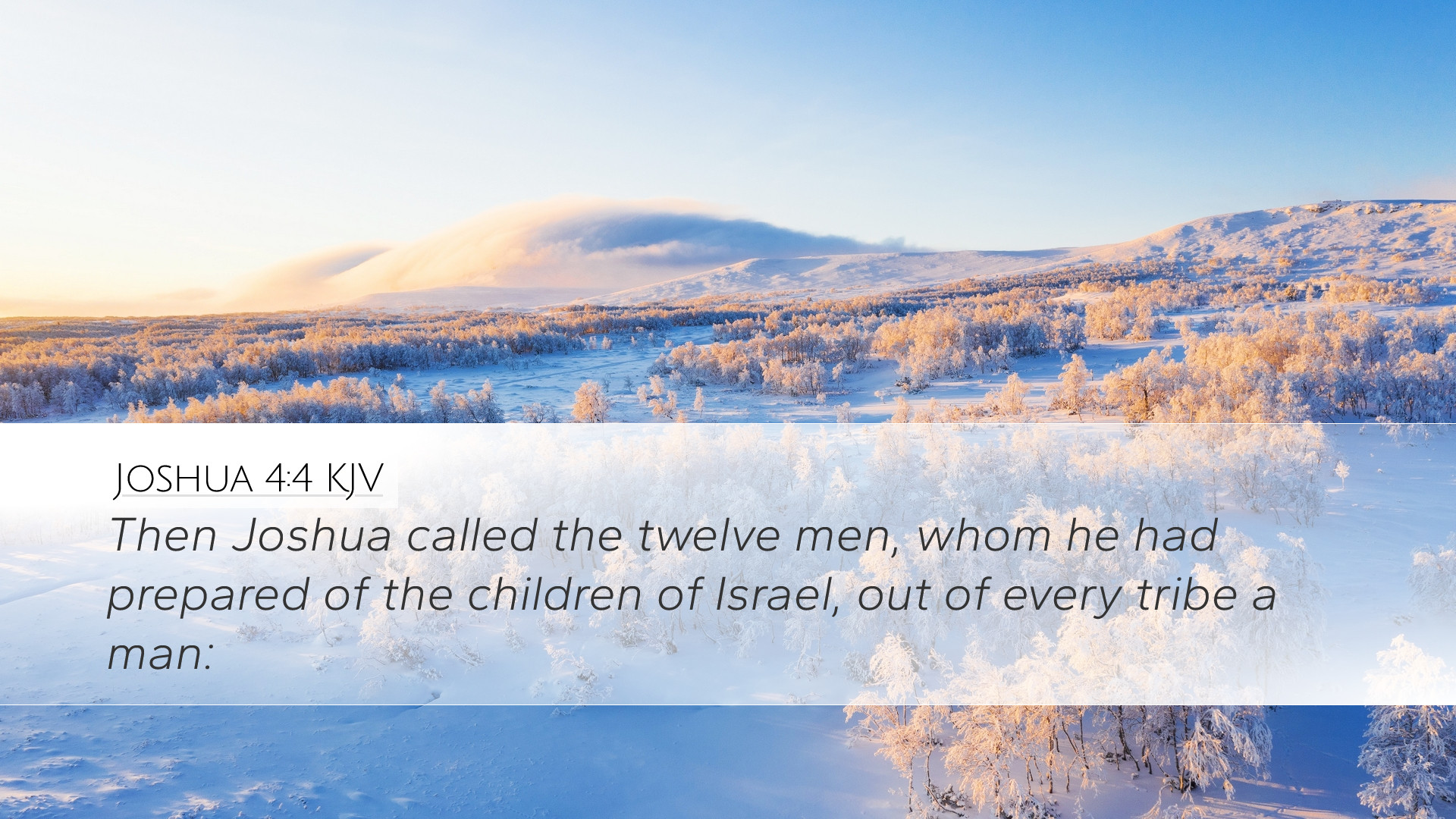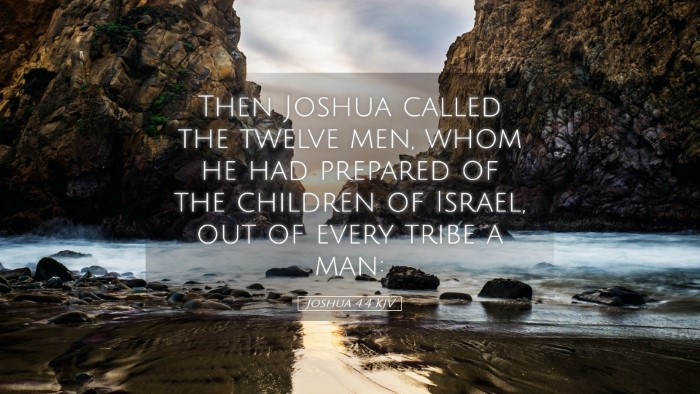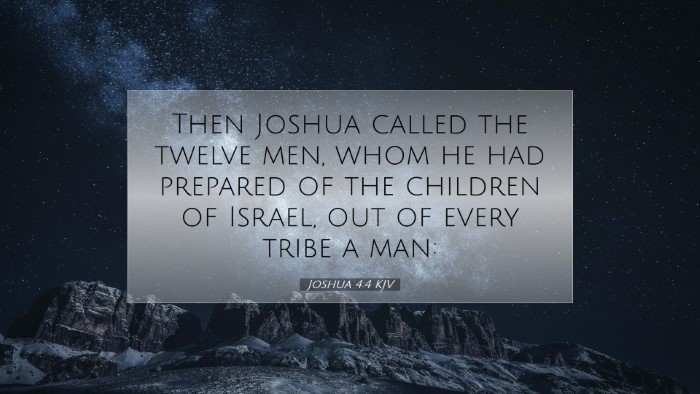Old Testament
Genesis Exodus Leviticus Numbers Deuteronomy Joshua Judges Ruth 1 Samuel 2 Samuel 1 Kings 2 Kings 1 Chronicles 2 Chronicles Ezra Nehemiah Esther Job Psalms Proverbs Ecclesiastes Song of Solomon Isaiah Jeremiah Lamentations Ezekiel Daniel Hosea Joel Amos Obadiah Jonah Micah Nahum Habakkuk Zephaniah Haggai Zechariah MalachiJoshua 4:4
Joshua 4:4 KJV
Then Joshua called the twelve men, whom he had prepared of the children of Israel, out of every tribe a man:
Joshua 4:4 Bible Commentary
Commentary on Joshua 4:4
Verse Text: "Then Joshua called the twelve men, whom he had prepared of the children of Israel, out of every tribe a man."
Introduction
This verse marks a pivotal moment in the history of Israel as they transition from wandering in the desert to entering the Promised Land. It serves as a crucial point in not just the narrative but also the theological underpinning of God's faithfulness and human response. This commentary collates insights from several public domain sources, including Matthew Henry, Albert Barnes, and Adam Clarke, to explore the depth and implications of this passage.
Contextual Overview
Joshua 4 is situated after the Israelites have miraculously crossed the Jordan River. The act of calling forth twelve men to represent each tribe is not incidental but is laden with meaning. It symbolizes unity, representation, and the collective identity of Israel as they embark on their new journey.
Historical Background
As Albert Barnes elucidates, the choice of twelve men mirrors the twelve tribes of Israel, highlighting the necessity of collective memory and representation in God's salvific plan. This was not merely an organizational move; it was a spiritual act aimed at cementing the tribes’ shared heritage.
The Call of the Twelve
Spiritual Significance:
According to Adam Clarke, the selection of representatives serves to emphasize the importance of each tribe in the overarching narrative of redemption. God’s engagement with each tribe underscores His unwavering promise to the people of Israel.
Divine Preparation
- Preparation of Leaders: Joshua’s act of calling forth the twelve men indicates proactive leadership. Matthew Henry notes that this preparation is vital for the establishment of a legacy of faith among the people.
- Community Involvement: The involvement of individuals from each tribe fosters a sense of community and shared responsibility as they prepare to recount the significance of their journey across the Jordan.
Symbolic Implications
This action symbolizes a collective experience of God's faithfulness and the physical embodiment of His promises. Each representative not only carries stones from the riverbed to serve as a memorial but also symbolizes the unity of the tribes in receiving the land promised to their forefathers.
Memorial Stones
Matthew Henry elaborates that these stones serve as a perpetual reminder of God's miraculous deliverance. The act of memorializing is an important function in spiritual life, urging future generations to remember the works of God and to teach them to their children.
Theological Reflections
This verse invites much theological discourse regarding leadership, communal identity, and the nature of remembrance in faith. As Barnes observes, the gathering of these men points towards a divinely ordained structure for remembering God's faithfulness throughout generations.
Leadership in Divine Mission
The role of Joshua as a leader becomes central in this text. His actions reflect a deep understanding of his responsibilities not just as a military commander but as a spiritual shepherd guiding the people of God into their destiny.
- Call to Leadership: Joshua's call emphasizes the importance of leaders being spiritually attuned to God's commands. They must prepare themselves and their communities for moments of significant transitions.
- Shared Responsibility: The involvement of distinct representatives suggests that every person within the community has a role in God's plan. Each tribe bears its own history and contribution, highlighting the beauty of diversity within unity.
Application for Today
For pastors, theologians, and lay leaders, the implications drawn from Joshua 4:4 encourage deeper reflection on how we can facilitate remembrance within our own communities. The communal aspect of faith has never diminished, and the church continues to serve as a collective body where shared memories and testimonies build faith.
Encouraging Collective Memory
Conclusion drawn from the text suggests that modern believers should engage in practices that cultivate remembrance, such as testimonies, communal worship, and rituals that recapture God’s faithful actions in our midst.
Conclusion
Joshua 4:4 serves as a powerful reminder of the continuity of God's promises interwoven through history, identity, and community. The thoughtful preparation of leaders and the call to recognize our collective identity is pertinent even today. By embracing the lessons embedded within this scripture, we can empower our communities to realize their collective journey of faith in a tangible and impactful way.


